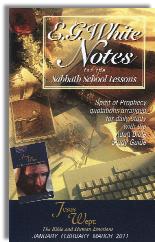|
||||||||||||||
Commentary on "Good Thinking"
Day 2: Sunday, January 30, 2011 - Thoughts: The Root of Behavior
Overview
The root of behavior is our thoughts, this lesson states, and we are directed to Mark 7:21-23. Jesus told His disciples that evil thoughts proceed from the heart of man, and that in order to control our actions and words, we need to control the thoughts that underlie them. Christians, like effective mental health clinicians, can identify what thoughts trigger undesirable behaviors and learn to control them. As Paul says in Romans 8, with the Spirit’s help, we can use our minds to seek good deeds instead of bad deeds. Ellen White said that our hearts will be transformed by placing our thoughts on what is pure and noble. Right-thinking is the only security of any soul.
Observations
None of Jesus’ words in the Mark 7 passage will make any sense until we understand what the human heart contains. Here Jesus gives the short version of what comes naturally from our hearts, and they include every evil thought and desire. He is alluding to Jeremiah 17:9,
“The heart is deceitful above all things, and desperately sick; who can understand it?”
The primary target of our deceitful hearts is our own minds. Our thoughts are desperately, relentlessly, and furiously dishonest. The first big lie our hearts tell us is that we’re really not that bad, well, not as bad as them. We can feel morally superior to the mass murderer, the gangster, or the gay man, but in the same moment, we also pass judgment on ourselves, Paul says, because, “you, the judge, practice the very same things” (Romans 2:1). In our hearts we are all murderers, gangsters, and sexual sinners.
Jeremiah asks, “Who can understand it?” None of us can look into the depths and name all our sinful desires. That is why all our efforts to think pure thoughts and practice “right-thinking” are only going to amplify our desires to sin. In our thinking, we will deceive ourselves into believing that our most corrupt thoughts are good. There is no security for the soul in thought-control therapies, for our thoughts proceed from our natures, which are sick and deceitful. Our problem lies deeper than our “undesirable” thought patterns. Our problem is our sinful natures that naturally live “in the passions of our flesh, carrying out the desires of the body and the mind” (Eph. 2:3). We don’t just have an impulse-control disorder. We sin because we naturally love it. We are by nature spiritually dead, and children of God’s wrath (Eph. 2:1, 3). Living in harmony with our natures is a fatal lifestyle.
Now let’s look again at Mark 7. Here Jesus is answering the Pharisees’ challenge of why the disciples did not wash their hands. They were offended that Jesus and His followers were not afraid of spiritual contamination on their hands or in their food. They thought that uncleanness could be controlled with good habits. Jesus exposed them as hypocrites, who’s outwardly clean behavior hid their hostility to God. Defiled is what we are on the inside, from the sick heart of deceitful thoughts and desires that Jeremiah described. All foods are clean, Jesus declared (Mark 7:19), so unclean food or hands has nothing to do with our spiritual condition. The root of our defilement is our spiritual deadness, with rebellious, hardened hearts that will not hear His voice (Heb. 4:15, 16).
You may be wondering why we keep talking about the new birth in these studies, when most of our readers pray, go to church, and believe in God. This is a good time to point out that many of us were good Pharisees, practicing clean habits while completely alienated from Christ. We avoided the Adventist equivalents of unwashed hands, habits like eating meat or smoking. These lessons have plenty of good advice about living cleaner like the Pharisees did, but nothing about the new birth. It assumes that the Christian life is about good thinking and habits. As SDA’s, we believed that by avoiding physical contamination and practicing healthy habits for the mind and body, we would have clearer minds to hear the voice of God. But God does not need a healthy body through which to be heard, for He regularly calls the sick and the dead to Him. Jesus is not offering a better, healthier program than what the Pharisees offered, or any health program at all. Jesus offers a new spiritual life which no self-improvement program can bring (John 3:5). God is a spirit, and those who worship Him must worship Him in spirit and truth (Jn. 4:24).
So then, how do we “set our mind on the things of the Spirit?” The Lesson has summarized Romans 8:5-8 this way: “The Spirit-filled mind will seek good deeds, and the sin-dominated mind will bring about sinful deeds.”
Are the things of the Spirit good thoughts and deeds? First of all, let’s look at how we obtain the Spirit’s power in our lives. Paul confronted the Galatians,
“Let me ask you only this: Did you receive the Spirit by works of the law or by hearing with faith? Are you so foolish? Having begun by the Spirit, are you now being perfected by the flesh?” Galatians 3:2, 3
The Spirit comes to make us alive and repentant when we hear the Gospel, when Christ is “publicly portrayed as crucified before our eyes” (Gal. 3:1). We are born from above when we see the Son of Man lifted up and we believe in Him. The Spirit does not come obediently when we just ask for him, or when we seek good deeds. That is because the Spirit brings glory to Christ (Jn. 16:13, 14). When we see Jesus lifted up for our sins on the cross, we are joined in His death by faith. From then on, we reckon ourselves dead to sin, and alive to God (Romans 6:11). So it is by hearing the Gospel with faith that we come into salvation, and also by hearing that the Spirit brings us under His control.
Now that the Spirit is joining us to Christ, we are able to set our minds on the “things of the Spirit.” In I Corinthians 2:13-14, we find that these “things of the Spirit of God” are the Word of God. As further evidence, Paul says in Ephesians 6:17,
“…and take the helmet of salvation, and the sword of the Spirit, which is the word of God…”
The things of the Spirit are the words of God, and specifically the words of the Gospel of Jesus. Through His sacrifice, all the promises of God have been bought and paid for. They are all “Yes” in Him (II Cor. 1:20). If we are trying to conquer sin merely by asking God to help us think and act better, we will fail. Any other way of obtaining Spirit power is of the flesh. The Spirit only acts through the Gospel of Christ who forgives our sins and gives us all things. This is what we set our minds upon that will bring the Spirit’s miraculous power.
Summary
- By focusing on right thinking we will have no security for our souls, because our thoughts proceed from our deceitful wicked natures. This deceit is beyond our understanding.
- Jesus taught that out of the heart come evil thoughts, desires, and deeds. That is why spiritual contamination from foods or unhealthy bodies does not defile our souls.
- Jesus is not offering a better, healthier program to give us healthy bodies that will hear Him. He is calling the spiritually dead to new life.
- We can only obtain the Spirit in our lives after He enables us to hear the Gospel of Christ crucified and we accept His forgiveness for our sins. The Spirit only comes through the Gospel.
- The things of the Spirit are the words and promises of God, bought by the blood of Christ. Any other means of using Spirit power is of the flesh and will fail.
Copyright 2011 BibleStudiesForAdventists.com. All rights reserved. Revised February 1, 2011. This website is published by Life Assurance Ministries, Camp Verde, Arizona, USA, the publisher of Proclamation! Magazine. Contact email: BibleStudiesForAdventists@gmail.com.
The Sabbath School Bible Study Guide and the corresponding E.G. White Notes are published by Pacific Press Publishing Association, which is owned and operated by the Seventh-day Adventist church. The current quarter's editions are pictured above.
Official Adventist Resources
Standard Edition Study Guide Week 6
Teacher's Edition Study Guide Week 6


